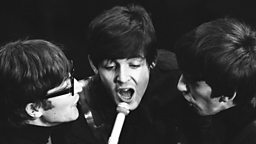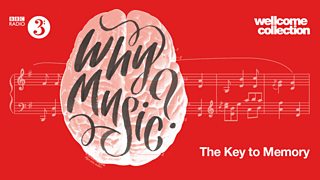Why the music we love as teens stays with us for life
Why is it that even the most adventurous music lovers are drawn back again and again to music they heard as teenagers? Cognitive neuropsychologist Dr Catherine Loveday explains the psychology that connects us with the music from our past – and reveals details of an exciting experiment that the University of Westminster is conducting with BBC Radio 3 listeners.
On my fortieth birthday, I decided that I wanted something from my friends that money couldn’t buy. I asked each of them to write down their ten favourite songs, together with a note about why they’d chosen them. As a lifelong lover of BBC Radio 4’s Desert Island Discs, I knew that this would give me a unique and very personal insight into the people who were most important to me – something that in later years would give me a deep sense of who those people were and why I had invited them to my party.
We are quicker to recognise tunes from this era than music we encounter at any other point in our lives
But once a scientist, always a scientist. I couldn’t help noticing a pattern in the songs that people chose. Even my most eclectic friends seemed to gravitate towards songs from their teenage years. It seemed that they were all being influenced by a well-established psychological phenomenon called the reminiscence bump.
We are quicker to recognise tunes from this era than music we encounter at any other point in our lives, and also more likely to include them on our playlist. This powerful and robust effect occurs not just for music, but also films, books and even footballers. And it lasts for a lifetime: people in their 80s and 90s will continue to show a better memory and stronger preference for things that they first experienced between the ages of 10 and 30.
Why are these memories so powerful and long-lasting?
The brain’s memory systems are at their most efficient during late adolescence and early adulthood. We also experience many things then for the first time, which makes them particularly memorable. But the key reason that we return to songs and anecdotes from this period of our lives is that they remind us who we are. It is during these formative years that we make many crucial life-changing decisions, initiate significant long-term relationships and establish the cultural and political beliefs which form our identity.
When people are asked about music that is important to them, they often favour songs that are associated with influential times, places and people – maybe their first holiday away from parents, a pivotal encounter with their future spouse, or a moment of self-discovery. One music producer I know, for example, chose Two Tribes by Frankie Goes to Hollywood, citing it as the sole reason that he decided to become a sound engineer. Songs connected to weddings, births and funerals are also very common, as are cultural references.

Does Frankie Goes To Hollywood "bump" your memory?
One possible reason for the strength of the musical reminiscence bump is that people tend to listen to more music during this period of their lives. Music has an intrinsic capacity to regulate emotions: what better way to manage the emotional rollercoaster of puberty than to wallow in Leonard Cohen, dance to Michael Jackson or chill out to The Orb?
Music plays a fundamental bonding role in many adolescent relationships, whether with family, lovers or friends
These songs naturally become embedded in our important memories, both positive and negative. In our experiments, people regularly choose songs that they have listened to during sad and difficult times, as well as those linked with better experiences. These tunes seem to offer an important reminder of the emotional light and shade that give life meaning.
Music also plays a fundamental bonding role in many adolescent relationships, whether with family, lovers or friends. In our analysis of Desert Island Discs, we found that one of the most frequent reasons for a guest’s record choice was that it reminded them of a specific person, often a parent or a partner.
It has even been suggested that there may be a “cascading reminiscence bump”. The music psychologist Carol Krumhansl has shown that teenagers have superior recognition for songs that come from their parents’ and grandparents’ reminiscence periods. So maybe my son’s love of The Beatles reflects my own fondness of the Fab Four, which in turn stems from my parents.

You don't need to have been a teenager in the 1960s to have strong musical memories of The Beatles
Does the reminiscence bump apply to classical music?
Most reminiscence bump research so far has focused on pop music, partly because it is so easy to date. We know relatively little about the extent to which this phenomenon occurs with classical music. Many classical music fans are trained musicians themselves: are their preferences still largely driven by their association with treasured memories? Or are they more likely to be guided by objective judgements about the music itself?
This is something we have been investigating with BBC Radio 3 listeners, who may have relatively few memories attached to Wham! or Gary Numan but will happily identify their favourite recording of Beethoven’s Ninth Symphony. Our predictions are that even this exceptionally discerning group of listeners will be drawn towards performances that they first heard in their youth. You’ll have to listen to a special edition of Record Review to find out if we’re right!

With so many different recordings of famous works available, will classical music fans still show preferences for their teenage favourites?
But the inextricable link between songs, feelings and personal history is there to see in anyone’s record collection. Scientists have even located a specific area of the brain – the medial prefrontal cortex – which connects memories and emotions with specific pieces of music. So, whether it’s Beethoven, The Beatles or Beyoncé, one thing is certain – music gives us a lifelong pathway to those all-important teenage memories, and a connection with the people we love.
Dr Catherine Loveday is a Principal Lecturer in cognitive neuroscience at the University of Westminster. The results of her experiment with BBC Radio 3 listeners will be revealed in a special edition of Record Review, broadcast live from Wellcome Collection as part of Why Music? The Key to Memory.
-
![]()
Record Review, live from Wellcome Collection
Cognitive neuropsychologist Catherine Loveday reveals the results of her experiment with Radio 3 listeners.
-
![]()
Why Music? The Key to Memory
Browse all programmes, clips and features from an exciting weekend of science and music.
-
![]()
The Strangeness of Memory
Eye witness accounts are crucial in court cases - but how reliable are people's memories?
-
![]()
Desert Island Discs
Eight tracks, a book and a luxury: what would you take to a desert island?




